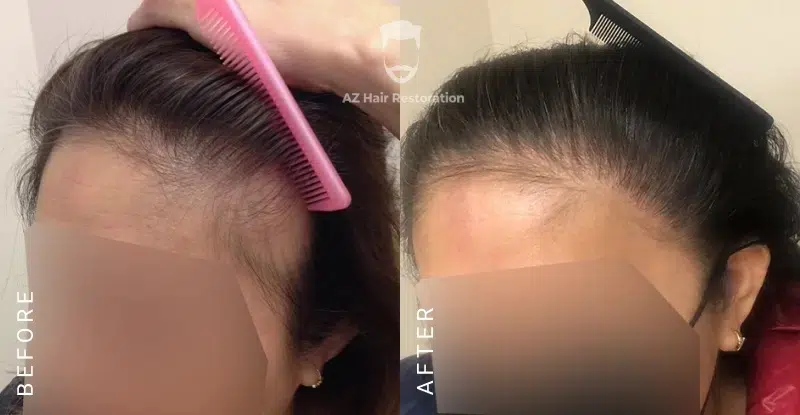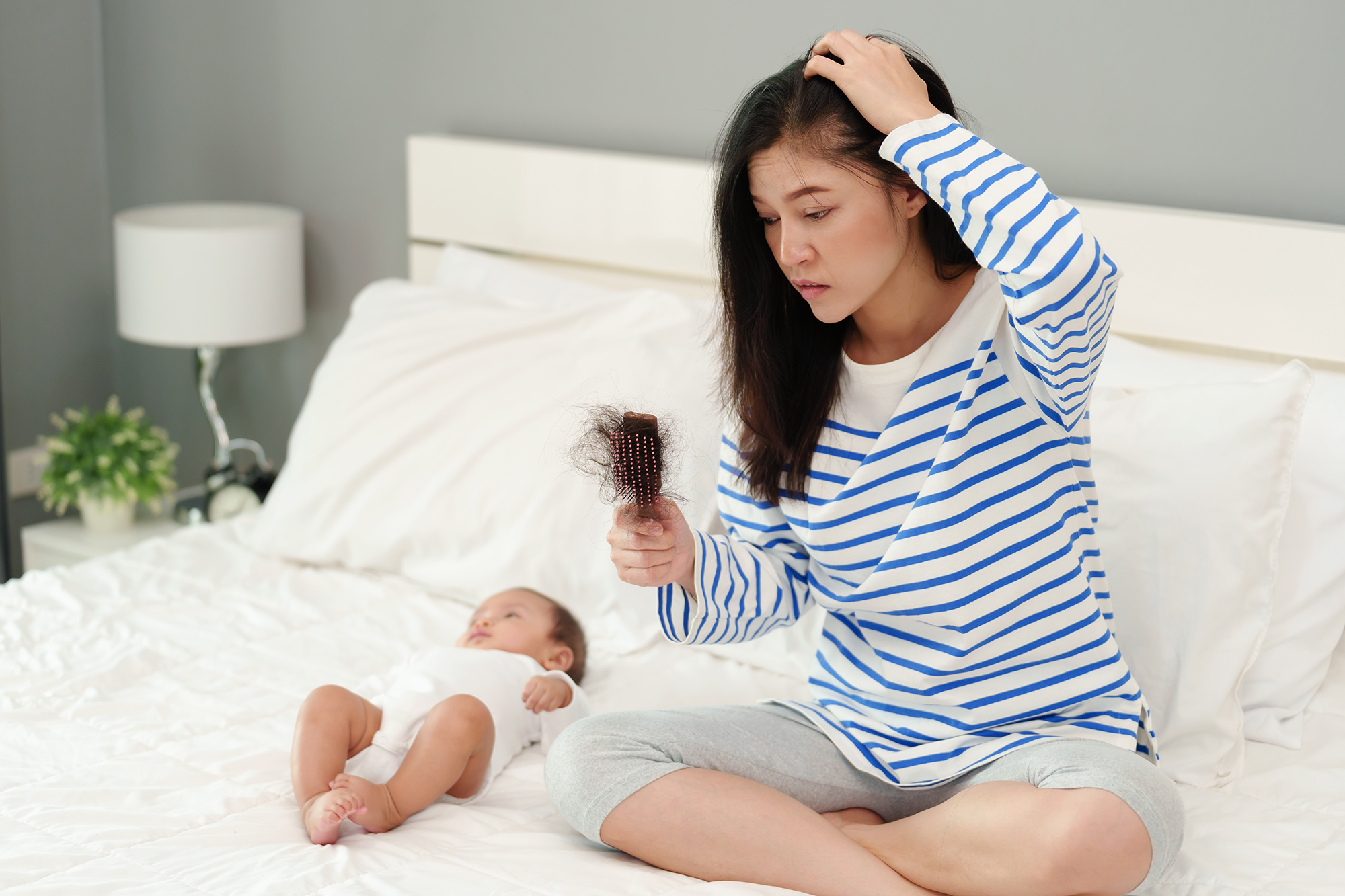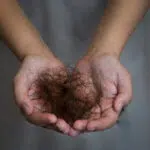Postpartum Hair Loss SOS: What Really Works to Get Your Hair Back
Last updated on October 15, 2025
Bringing a baby into the world is life-changing, but for many new mothers, it also comes with unexpected changes in hair health. Around two to six months after giving birth, you might notice more hair than usual in your hairbrush, shower drain, or on your pillow. While this can feel alarming, it is usually temporary and linked to normal changes in your body. Understanding what causes postpartum hair loss, how to care for your hair during this time, and when to get professional help from a hair loss doctor can make a big difference in how you manage it.
What causes postpartum hair loss?
During pregnancy, higher estrogen levels keep hair in the growth phase for longer. This means less daily shedding, giving many women fuller, thicker hair. After childbirth, estrogen levels drop back to pre-pregnancy levels, and the hairs that were being held in the growth phase shift into the shedding phase. This process, called telogen effluvium, is the main reason behind postpartum hair loss.
Other factors can make hair shedding more noticeable. These include:
- Physical stress from delivery
- Hormonal changes
- Changes in nutrition
- Sleep deprivation
- Emotional stress in adjusting to life with a newborn
When does postpartum hair loss start?
For most women, shedding begins around two to three months after giving birth. The amount of hair lost can vary from person to person. Some notice only mild thinning, while others experience significant shedding, especially around the hairline and temples. The good news is that the process is usually temporary.
When does postpartum hair loss stop?
Most women see improvement within six to twelve months after childbirth. By the time your baby turns one, your hair cycle is usually back to its pre-pregnancy rhythm. In some cases, shedding can last longer, particularly if there are other contributing factors such as thyroid imbalances, iron deficiency, or ongoing stress.
If hair loss continues beyond a year, it is important to speak with a doctor to rule out other conditions.
How to stop postpartum hair loss and promote hair growth
While you cannot completely prevent this natural shedding, there are ways to reduce its severity and support healthier regrowth.
1. Nourish your body from the inside out
Eat a balanced diet rich in protein, iron, zinc, vitamin D, and B vitamins. These nutrients are essential for healthy hair growth. Postnatal vitamins can help fill gaps if your diet is lacking.
2. Be gentle with your hair
Avoid tight hairstyles that pull on the roots. Use a wide-tooth comb to detangle wet hair, and minimise heat styling to prevent breakage.
3. Choose the right hair care products
Look for shampoos and conditioners formulated to add volume and strengthen hair. Avoid heavy products that can weigh hair down and make thinning more obvious.
4. Manage stress
Stress can impact the hair growth cycle. Gentle exercise, deep breathing, and seeking support from family and friends can help keep stress levels in check.
5. Consider medical hair loss treatments
If shedding is severe or prolonged, targeted treatments like Growth Factor Therapy, exosomes therapy, or prescription hair growth medications may help. These should always be discussed with a medical professional who specialises in hair restoration.
How to prevent postpartum hair loss
While you cannot completely prevent hormonal-related shedding, you can give your hair the best possible chance to recover quickly by:
- Continuing to take postnatal vitamins if advised by your doctor
- Eating a nutrient-dense diet
- Keeping the scalp healthy and clean
- Avoiding chemical treatments such as bleaching or harsh dyes in the early months postpartum
- Following a gentle hair care routine and limiting stress where possible
When to see a doctor for postpartum hair loss
It is normal to lose more hair after having a baby, but you should seek professional advice if:
- Hair loss continues beyond twelve months postpartum
- You notice patchy bald spots
- Your scalp is red, itchy, or sore
- You have other symptoms such as fatigue, mood changes, or changes in weight

At AZ Hair Restoration in Raleigh, NC, Dr. Arthur Zacco has over 30 years of experience in diagnosing and treating all types of hair loss, including postpartum shedding. A thorough consultation can help identify whether your hair loss is purely hormonal or if another condition is contributing.
Supporting healthy hair regrowth with medical hair loss treatments
Hair regrowth after childbirth takes time. Most women will see their hair return to its pre-pregnancy fullness with proper care, patience, and, if needed, targeted medical treatments. Regular follow-up with a hair loss specialist can help track progress and make adjustments to your care plan.
At AZ Hair Restoration, we understand the emotional impact of postpartum hair loss and work with you to create a treatment plan that fits your lifestyle and needs. Whether you want to explore non-surgical options, medical treatments, or a combination of both, Dr. Zacco and our team are here to help – book an appointment today.
FAQs
How can I stop postpartum hair loss quickly?
While you cannot stop it overnight, you can reduce its severity with gentle hair care, balanced nutrition, stress management, and targeted medical hair loss treatments. Dr. Arthur Zacco can create a customized plan using proven therapies to help speed recovery. Book your free consultation at our Raleigh clinic for expert guidance.
Is postpartum hair loss permanent?
No, it is usually temporary. Most women regain their pre-pregnancy hair density within a year. If shedding persists, we can investigate other causes and treatments. At AZ Hair Restoration, Dr. Arthur Zacco offers effective medical and non-surgical solutions to help restore your hair. Book your initial free consultation at our hair loss clinic in Raleigh, NC, today.
Can breastfeeding affect postpartum hair loss?
Breastfeeding itself does not directly cause hair loss, but it can contribute to nutrient depletion if your diet is lacking. Since your body prioritises nutrient use for milk production, hair may grow more slowly. At AZ Hair Restoration in Raleigh, Dr. Arthur Zacco can assess your nutrient levels and recommend safe, effective treatments to encourage regrowth while breastfeeding. Book your appointment for personalised postpartum hair care advice.
Can thyroid problems worsen postpartum hair loss?
Yes. Thyroid imbalances, which can develop after pregnancy, may contribute to prolonged or excessive shedding. Symptoms may include fatigue, weight changes, mood swings, continued insomnia, and dry and brittle hair and nails. At AZ Hair Restoration, Dr. Arthur Zacco can coordinate testing for thyroid issues and nutrient deficiencies, and create a treatment plan that supports both your hair and overall health. Contact our clinic in Raleigh, NC, today to make an appointment so we can identify the root cause of your hair loss.
Is there a difference between postpartum hair loss and alopecia?
Yes. Postpartum hair loss is a temporary shedding caused by hormonal shifts after pregnancy, while alopecia can be long-term or permanent and has different causes. If you are unsure which you have, Dr. Arthur Zacco at AZ Hair Restoration in Raleigh can diagnose the condition and recommend the most effective treatment. Book your initial free hair loss consultation to get clarity and a personalised care plan.
Can postpartum hair loss reveal underlying deficiencies?
Yes. In some cases, postpartum shedding can be made worse by iron, vitamin D, or other nutrient deficiencies. At AZ Hair Restoration, Dr. Arthur Zacco can arrange for testing to identify and address these deficiencies, helping to plan non-surgical hair loss treatment and restore healthy hair more quickly. Book an initial free consultation at our Raleigh clinic to get a thorough hair and scalp assessment.








